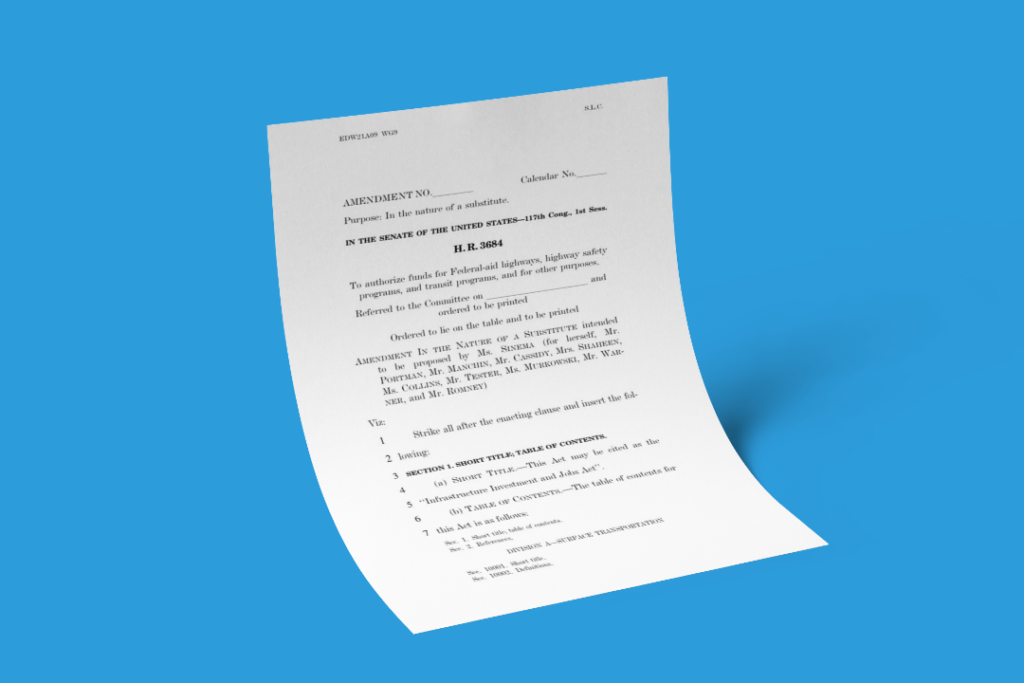 This week, the U.S. Senate took a historic step to start paying back the debt America owes to the communities that have powered our nation for generations. As the fossil fuel industry declines, the people in the places where mines and power plants shut down have often been left out of the economic prosperity much of the rest of the country has enjoyed. The bipartisan bill, while not perfect, represents unprecedented progress in the effort to create a more prosperous and equitable economic future in these communities.
We are especially excited that many of the bill’s provisions are in line with the investment priorities identified in the National Economic Transition (NET) platform. The key pillars of this platform, developed by a coalition of our coal community partners from across the country, are reflected throughout the legislation in significant ways. And—coming also on the heels of the Economic Development Administration’s landmark announcement of $300 million in funding for coal communities—the bill creates momentum for additional progress that can be achieved in the budget reconciliation process and beyond.
This week, the U.S. Senate took a historic step to start paying back the debt America owes to the communities that have powered our nation for generations. As the fossil fuel industry declines, the people in the places where mines and power plants shut down have often been left out of the economic prosperity much of the rest of the country has enjoyed. The bipartisan bill, while not perfect, represents unprecedented progress in the effort to create a more prosperous and equitable economic future in these communities.
We are especially excited that many of the bill’s provisions are in line with the investment priorities identified in the National Economic Transition (NET) platform. The key pillars of this platform, developed by a coalition of our coal community partners from across the country, are reflected throughout the legislation in significant ways. And—coming also on the heels of the Economic Development Administration’s landmark announcement of $300 million in funding for coal communities—the bill creates momentum for additional progress that can be achieved in the budget reconciliation process and beyond.
The investments in the bill matching those called for in the NET platform include:
- $1 billion for the Appalachian Regional Commission, a crucial tool for supporting economic development in the coal-impacted region of Appalachia.
- $65 billion for broadband, to close the digital divide and help enable economic development and address inequities in the hardest-hit areas.
- $11.3 billion for abandoned mine reclamation, to create jobs cleaning up the dangerous sites left behind by the declining coal industry.
- $55 billion for water infrastructure, to help expand access to clean water in coal communities—especially tribal communities—that is foundational to building sustainable and prosperous economies.
- $73 billion for power infrastructure, ensuring that transmission lines and other critical infrastructure can support developing clean energy sectors.
We applaud the Senators who supported this bill and those in the Biden Administration who helped develop the framework. One bill cannot solve the many complex issues facing coal communities. We encourage Congress to consider additional investments and policies, both in this legislative package and beyond, that match the NET platform. These include:
- Build community capacity to leverage federal funding to help community-based organizations navigate the complicated landscape of federal programs and support.
- Policy changes to tie broadband investments to affordability, requiring providers who receive federal funds to provide free or sliding-scale services to low-income residents.
- Ambitious investments in workforce training across growing sectors to help coal-impacted places connect their residents—including current and former coal workers —to high-wage jobs of tomorrow.
- Expanding funding for coal mine land reclamation at sites not currently eligible for AML funding, where permits have been forfeited due to bankruptcy.
- Bold investments in community solar, residential and small commercial distributed solar, and energy efficiency in coal-impacted communities.
- Investments in value-added, sustainable farming and food businesses to build more resilient local food systems.
- Support miners suffering from black lung disease by ensuring the continued solvency of the Trust Fund, extending the black lung excise tax, at minimum, and considering a 25% increase in the rate
Ensuring the infrastructure bill is enacted into law is now vitally important—and we can’t stop there. We are eager to work with local, state, and federal leaders to build upon it with new policies and investments necessary to create the equitable, inclusive, and sustainable communities that the people and places that have powered our nation deserve.